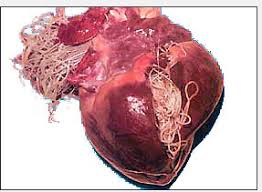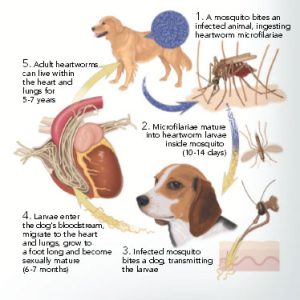Heartworm disease is caused by blood-borne parasites known as Dirofilaria immitis. These worms cause a serious and potentially fatal disease. These worms are found in the heart and neighboring blood vessels of dogs.

Heartworm Disease
Heartworm disease is transmitted from one dog to another by mosquitoes. These insects bite an infected animal, causing the microfilariae to enter the mosquito’s system and continue development into infective larvae. These larva then gets transmitted to other dogs when the mosquito feeds on them.
The infective larva mature into adult heart worms in about 6 months. The worms travel around the animal’s body, eventually reaching the blood vessels of the lungs causing damage and reducing the heart’s ability to pump.
Symptoms of heartworm Disease
– coughing
– shortness of breath/ panting
– sudden death
How is heartworm disease diagnosed?
A serological test to detect antigens (proteins) produced by female adult worms is carried out. As the test only detects antigens produced by the female heartworm, false negatives may occur.
How is heartworm disease treated ?

Image taken from LaveenVetCenter.Com
An injectable drug to kill adult heartworms is given into the back muscles of dogs. This injection is usually divided and given a month apart. It is important that dogs are confined during treatment as there is a risk of the decomposing adult worms being lodged in the smaller blood vessels of body causing other problems. Post-treatment complications are often caused by the decomposing dead heartworms.
Your veterinarian might give your dog a course of antibiotics as well to get rid of the bacteria (Wolbachia) that is carried by the heartworm. A course of steroids will help with the inflammatory disease caused by the decomposing adult heartworms as well.
Prevention of heartworm disease
Starting on a heartworm preventative kills any developing immature heart worms to minimize the risk of heartworm disease. These preventatives come as topical monthly products or even oral monthly products. Alternatively, yearly injections are available by veterinarians as well to protect your dog against heartworm disease.